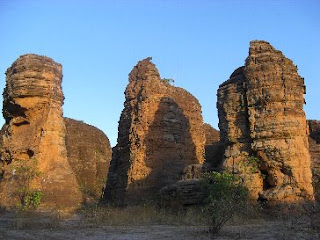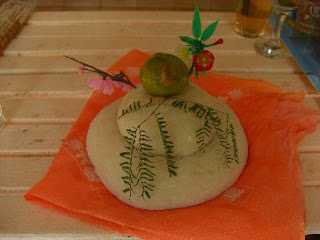Since January 19, I teach 4 classes about environment at a private college EvéliqueⅡ (junior high and high school level).
Once a week on Tuesday 7:00 (too early for me...)-9:00 and 10:00-11:00. Wednesday 10:00-11:00.
There are 60 students in one class "at least".

In the photos class, there are 88...!!!

Honestly it is impossible to control the class. (see ? how small I look in the class !)
One class is for 55mins but can you imagine how long it takes to calm kids down...
But at the same time, many of them are so active and want to answer to my questions with saying " Madame, moi (me) ! Madame, moi !!!" The atmosphere is very different from that in Japan where many kids don't react, say nothing until the teacher ask one of them to answer.
Their age in the same class varies about 11-15 years old.
That is because (I imagine) in Burkina, kids have to pass an exam to go on to the next grade from the primary school.
That day's subject was "Deforestation and forest(tree) protection".
Q1. Why there is less forests (trees)?
Q2. Why we cut trees, how we use these trees in daily life ?
If there is feu or no more trees, how it will be our life ?
Q3. So what should we do ?

At each class, I take some time to let them work on group and present their answers.
My purpose is to let them think spontaneously about different environmental problems and take action eventually.

During group work (discussion)

Some examples:
Q1's answers ;
- we cut lots of trees but we don't plant new ones,
- (especially domestic) animals walk around freely and eat up plants and trees (leaves),
-put fire on the grass to get more fields and hunt wild animals or because people believe that burn grass help to get more fertile soil.
Q2's answers ;
- firewood, charcoal,
- tables, chairs, furniture, cooking tools,
- paper, notebooks, kleenex, pencils,
- to build houses,
- a tool to throw rocks in order to hunt birds (kids do often)


I use these drawings to visualize their answers instead of writing down words.
Q3's answers ;
- do not cut too many trees,
- plant trees and take care of them,
- suggest their mother to use "improved oven" which consumes less firewood,
- do not waste paper, notebooks,
- use carefully tables, chairs,
- Control domestic animals etc.
Other (future) subjects are sanitation (washing hands, using toilets), waste (garbage), energy, water, pollution etc...
The challenges are not only to organise a active&interesting class content but also to control the whole class and to participate maximum number of students in the class.
Besides, I hope that the school teachers take these environmental issues in their class and I do that in hours when there is no other class by myself.
I am thinking how to do this...
 I learned a lesson from the last workshop.
I learned a lesson from the last workshop. 
 She (in the bottom photo) is already a compost master and played very well the role of instructor (assistant) that I wished.
She (in the bottom photo) is already a compost master and played very well the role of instructor (assistant) that I wished. 

pt.jpg)

pt.jpg)
pt.jpg)
pt.jpg)
ppt.jpg)
pt.jpg)
pt.jpg)
pt.jpg)
pt.jpg)
pt.jpg)
pt.jpg)
pt.jpg)
pt.jpg)
pt.jpg) I found a buddha face rock.
I found a buddha face rock. pt.jpg)
pt.jpg)
pt.jpg)
pt.jpg)
pt.jpg)
pt.jpg)
pt.jpg)



pt.jpg)
pt.jpg)
pt.jpg)
pt.jpg)
pt.jpg)
pt.jpg) First piece of cake in 2009 :p
First piece of cake in 2009 :p pt.jpg)
pt.jpg)
